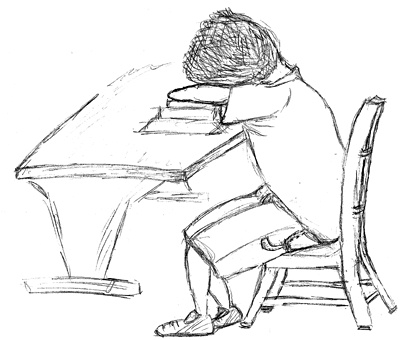All Nonfiction
- Bullying
- Books
- Academic
- Author Interviews
- Celebrity interviews
- College Articles
- College Essays
- Educator of the Year
- Heroes
- Interviews
- Memoir
- Personal Experience
- Sports
- Travel & Culture
All Opinions
- Bullying
- Current Events / Politics
- Discrimination
- Drugs / Alcohol / Smoking
- Entertainment / Celebrities
- Environment
- Love / Relationships
- Movies / Music / TV
- Pop Culture / Trends
- School / College
- Social Issues / Civics
- Spirituality / Religion
- Sports / Hobbies
All Hot Topics
- Bullying
- Community Service
- Environment
- Health
- Letters to the Editor
- Pride & Prejudice
- What Matters
- Back
Summer Guide
- Program Links
- Program Reviews
- Back
College Guide
- College Links
- College Reviews
- College Essays
- College Articles
- Back
A Lack of Sleep in Teens
Did you know teenagers need 8 to 10 hours of sleep each night? Some teenagers only get half that time! One study found that only 15% students reported sleeping 8 1/2 hours on school nights. If they don’t get the right amount of sleep, it could affect their performance in school, focus, and attitude. Irregular sleep patterns can hurt teen’s grades and quality of sleep.
Lack of sleep for students can cause many problems. One of these problems is performance in school. Teens can have a hard time focusing and learning in school because they are exhausted. According to the National Sleep Foundation, “[Teens] are like zombies getting ready for school and find it hard to be alert and pay attention in class. Because they are sleep deprived, they are sleepy all day and cannot do their best.” Students stay up late to get schoolwork done, and have to get up the next day to do it all over again with an insufficient amount of energy in their bodies.
Another leading problem is mood changes. Not enough sleep can cause adolescents to act differently, such as depressed and drowsy. According to a poll conducted in 2006 by NSF, “In fact, 73% of those adolescents who report feeling unhappy, sad, or depressed also report not getting enough sleep at night and being excessively sleepy during the day.” A lack of sleep for students can cause them to look and act unhappy at school. This mood change can also cause aggression toward teachers and students. The National Sleep Foundation says, “[Lack of sleep] can lead to aggressive or inappropriate behavior such as yelling at your friends or being impatient with your teachers or family members.” Not getting the sleep students need can cause behavioral problems in school.
On the other hand, there are possible solutions to the teen’s sleep loss. One solution could be naps. Some people think naps are a waste of time, but it might just be the solution to getting teen’s sleep schedule back on track. According to NSF, “Naps can help pick you up and make you work more efficiently, if you plan them right. Naps that are too long or too close to bedtime can interfere with your regular sleep.” If students can take a nap during the day to replenish their energy, then they are more likely to perform better in their work.
Another solution could be that students should have less screen time before bed and doing their work before bed time. Last minute homework and phones are a big reason why teens aren’t getting the vital sleep they need. According to the National Sleep Foundation, “Don’t leave your homework for the last minute. Try to avoid the TV, computer and telephone in the hour before you go to bed. Stick to quiet, calm activities, and you’ll fall asleep much more easily!” Teens get very distracted easily before bed by things like school and media, causing them to lose sleep.
A final solution is schools starting at a later time. Although teens cannot help this, schools are realizing that their students don’t get much sleep, so they are working toward helping to remedy this problem. According to the National Institutes of Health, “In 2014, the American Academy of Pediatrics published a policy statement urging middle and high schools to adjust start times to permit students to obtain adequate sleep and improve physical and mental health, safety, academic performance, and quality of life.” Without the struggle of getting up early, students will be able to think and learn better if schools started at later times.

Similar Articles
JOIN THE DISCUSSION
This article has 0 comments.
